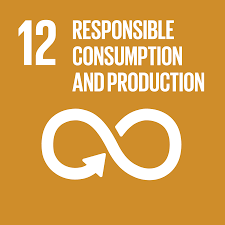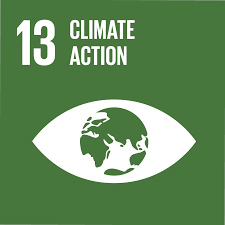What is the best solution for climate change?
- Blen

- Mar 10, 2021
- 6 min read
This article is focused on the following UN Sustainable Development goals:
An Oxford University study indicated that the dietary greenhouse-gas emissions among meat-eaters were between 50 and 54 per cent higher than those of vegetarians and between 99 and 102 per cent higher than those of vegans. In regards to this, we can see the importance of plant-rich diets in order to reduce climate change.
Climate change is one of the most pressing issues that is currently threatening our existence. The UN climate report and subsequent reports have warned us that global carbon emissions must be cut in half in the next 10 years for us to avoid irreversible damage to our planet. And we are going in the opposite direction. Our future is at stake due to our self-indulgent actions. Taking this issue as a top priority, we need to address it now. Therefore this article will focus on one best solution towards climate change, plant-rich diets, specifically to reduce greenhouse gas emissions.

Plant-based diets are rich in vitamins and minerals. People shift to plant-rich diets as they tend to be healthier leading to lower rates of diseases. However, these plant-rich diets also reduce demand, as a result, reducing land clearing, fertilizer use, burping cattle and most importantly, greenhouse gas emissions. Project drawdown, an organization with a new way of thinking about and acting on global warming, published 100 solutions to reduce climate change. According to the top 20 solutions on “Project Drawdown” eight of them are related to the food system, plant-rich diets which reduce 65.01–91.72 gigatons of CO2, standing on number 4 on the list. This makes the food sector one of the most important areas that can contribute to reverse climate change. Despite the difficulty to bring about a dietary change due to different influences, shifting to a plant-rich diet is the best solution to stop climate change as it prevents the huge green-house gas emissions by livestock.
A Plant-rich diet is the best solution to stop climate change as it prevents the emission of greenhouse gases by livestock. The transportation of foods to livestock has been one of the great sources of greenhouse gases. Vast areas of forests and natural habitats such as the Amazon rainforest have been destroyed to grow miles of soya fields. Soya bean production releases carbon dioxide and other greenhouse gases and globally 90% of it is used to feed animals (The challenges we face; Soya).

Associated with the previous point, providing food, killing, processing and transporting animals is extremely energy-intensive. In order to feed animals, we have to cut down trees and provide them with pasture land and crops which will increase emissions. In addition to that, the animals themselves and their wastes produce huge amounts of greenhouse gases (Fight climate change by going vegan). Land use, how we grow, get and eat our food has also a large impact on climate change. The food system which includes processing, transporting, storing and consuming accounts for a third of the greenhouse gas emissions. 23% of greenhouse gas emissions come from agriculture, livestock and the land used to raise them (UN report: plant-based diets).
Regarding the general quantities of greenhouse gas emissions by livestock, animal agriculture is the biggest emitter of methane which is 25 times as effective as CO2 at trapping heat. Meat, egg and dairy products produce 65% of nitrous oxide which is 300 times more harmful than CO2. Producing a calorie from an animal takes about 11 times as much fossil fuel compared to producing it from a plant. Therefore, eating vegan foods rather than animal-based foods is the best way to reduce our carbon print (Fight climate change by going vegan).
Meat eaters that eat more than 3.5 ounces of meat per day emit 15.8 pounds of CO2 per day while vegetarians and vegans emit 8.4 and 6.4 respectively. Meat eaters emit greenhouse gases 50-54% more than vegetarians and 99-102% than vegans (Fight climate change by going vegan). This shows the significant emission difference between plant-based and meat-based diets, presenting plant-rich diets as the best path to stop climate change.
Regarding individual-level solutions for climate change, making a change in our eating habits will convey a message to the food manufacturers (UN report: plant-based diets). In turn, this could reduce climate change.
"Forget about coal and cars, because the fastest way to address climate change would be to dramatically reduce the amount of meat people eat."
Ilmi Granoff, director of climateworks foundation’s sustainable finance program. This indicates that a plant-rich diet is the best solution for alleviating climate change. In addition to that, the U.N. report stated that “a shift toward plant-based diets” is one of the most significant ways to reduce greenhouse gases from the agriculture sector.” These are some quotes from sources that specialize in this sector. The points mentioned above indicate the extensive importance of plant-rich diets in reducing climate change. As we can see, animal products emit a huge amount of greenhouse gas however by adapting to plant-rich diets we will be able to prevent that. Furthermore, a plant-rich diet has a positive effect in a different range of areas. As we adopt a plant-rich diet, it conveys a message to the food manufacturers so then they will start growing more plant-based foods. This in turn affects our land use positively which will reduce climate change as lands are a powerful carbon sink.

A Plant-rich diet improves our health and also preserves our water resources, biodiversity and the atmosphere along the way. In Addition to the sustainability and low greenhouse emissions of plant-based foods, they also lower rates of chronic diseases which makes them significant to our health (Project drawdown: Plant-rich diets). A vegan diet is not only known for its health benefits but also for its environmental benefits. Livestock wastes get into water sources and pollute the water. Furthermore, livestock generates ammonia, therefore acid rains are caused which inturn pollutes water sources. However, a vegan diet preserves water sources by preventing the pollution caused by animal wastes.
Furthermore, cattle farming was responsible for 63% of the Amazon rainforest destruction as it got cut down to produce food for livestock. Therefore by adopting a plant-rich diet we can preserve nature and most importantly the Amazon rainforest (Earth’s lung). In addition to that, livestock farming consumes a lot of water to produce meat. 1Kg of meat needs 13,500 litres while 1 kg of corn needs 238 litres (How a plant-based diet can impact our environment). Therefore, as animal farming has harmful effects such as deforestation, water pollution and greenhouse gas emission we can reduce our impact on our environment by shifting our diet to plant-based diets.
Dietary change is not only affected by our personal choice but also cultural and external influences such as availability and affordability which makes it hard to achieve. Dietary change is not only a personal choice, availability and affordability are also some factors that might affect it. Therefore policies should be enacted in regards to this. (UN report: plant-based diets). If food manufacturers understand the challenges of plant-based diets such as accessibility, convenience, affordability etc, it would be easier to shift to plant-rich diets (The challenges of maintaining a plant-based lifestyle). Dietary change is not as simple as eating is profoundly personal and cultural (Project drawdown: plant-rich diets). Our personal consumption choice might fluctuate at times. 84% of people who quit eating animal products gradually change their mind and go back to a meat-inclusive diet. This is because a plant-based diet lifestyle needs discipline, planning, open-mindedness and also resilience to social pressure (The challenges of maintaining a plant-based lifestyle). This indicates that shifting from a meat-inclusive diet to a plant-rich diet is not only a personal choice, but external influences such as our culture, affordability, availability and others play a role in our consumption choices/decisions. Furthermore, it is difficult to change our mindset in order to adapt to this change. Therefore, the points discussed above show the challenges we face as we proceed to implement this solution. Even though the solution might be great, it will not be easy to achieve.
With all these things in mind, we can deduce that a plant-rich diet is the best solution for assuaging climate change. This is due to its importance in reducing greenhouse gas emissions, especially from livestock. Plant rich diet is estimated to reduce 65.01 - 91.72 gigatons of CO2 within the next 30 years. A change in land use will also come as a secondary impact of dietary change. Directly or indirectly, the range of areas plant-rich diet affects in order to reduce climate change is multiple. Health benefits are just one side effect of adopting a plant-rich diet for climate change. However, this solution is not simple to achieve due to the external influences we face. Nevertheless, it is undeniable that a plant-rich diet is the most impactful solution if the right policies are enacted to achieve it.
Works Cited
"Fight Climate Change by Going Vegan." PeTA, www.peta.org/issues/animals-used-for
food/global-warming/. Accessed 29 Apr. 2020.
"Plant-rich diets." Project Drawdown, drawdown.org/solutions/plant-rich-diets. Accessed 29
Apr. 2020.
Pytel, Brandon. "UN Report: Plant-Based Diets Provide 'Major Opportunities' to Address
Climate Crisis." Earth Day, 8 Aug. 2019, www.earthday.org/un-report-plant-based-diets-
provide-major-opportunities-to-address-climate-crisis/. Accessed 29 Apr. 2020.
Rigaud, Elise. "How a Plant Based Diet Can Impact Our Environment." RefiillMyBottle, 16
July 2019, refillmybottle.com/blog/how-a-plant-based-diet-can-impact-our-
environment. Accessed 29 Apr. 2020.





Comments